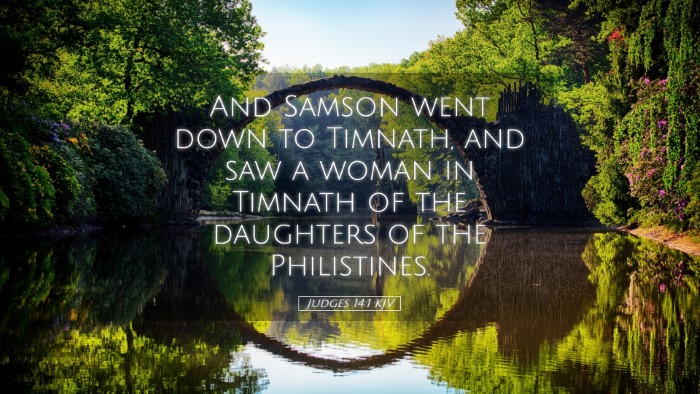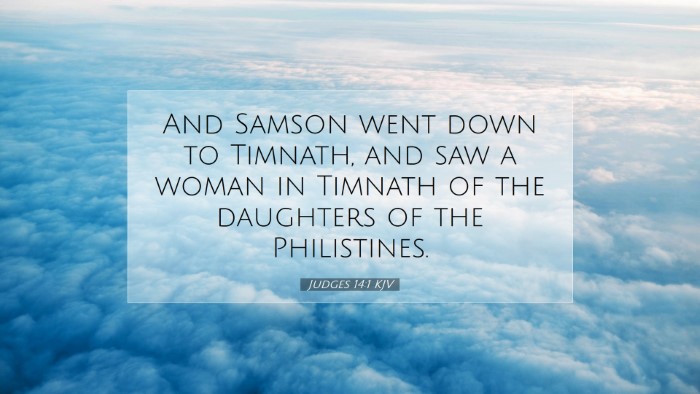Old Testament
Genesis Exodus Leviticus Numbers Deuteronomy Joshua Judges Ruth 1 Samuel 2 Samuel 1 Kings 2 Kings 1 Chronicles 2 Chronicles Ezra Nehemiah Esther Job Psalms Proverbs Ecclesiastes Song of Solomon Isaiah Jeremiah Lamentations Ezekiel Daniel Hosea Joel Amos Obadiah Jonah Micah Nahum Habakkuk Zephaniah Haggai Zechariah MalachiJudges 14:1
Judges 14:1 KJV
And Samson went down to Timnath, and saw a woman in Timnath of the daughters of the Philistines.
Judges 14:1 Bible Commentary
Commentary on Judges 14:1
Judges 14:1 states:
"And Samson went down to Timnah, and saw a woman in Timnah of the daughters of the Philistines."
This significant verse begins the narrative of Samson, one of the most enigmatic judges of Israel. His story is interwoven with themes of strength, divine purpose, and the complexities of human choices. Various public domain commentaries provide insightful reflections on this text.
General Context
The events surrounding Samson occur during a tumultuous period in Israel's history, characterized by moral decay and foreign oppression. The Israelites, having turned away from God, faced numerous conflicts with the Philistines. Samson's birth was prophesied, and he was chosen to begin the deliverance of Israel from these oppressors.
Insights from Matthew Henry
Matthew Henry comments on Samson's actions, noting that his descent to Timnah symbolizes a willingness to interact with the Philistines, the enemies of Israel. He observes:
- Disregard for God's Law: Samson's choice to seek a wife from among the Philistines showcases a departure from God's commands, which prohibited intermarriage with pagans.
- Impulsive Decisions: Henry highlights that Samson's motivations were driven largely by lust rather than spiritual discernment, illustrating the dangers of a heart led by carnal desires.
- Divine Sovereignty: Despite his failings, God’s sovereign plan is evident. God uses even Samson's flawed desires to forward His purpose in Israel, illustrating the complexity of God's interaction with human sin.
Insights from Albert Barnes
Albert Barnes provides a more contextual view of the significance of Timnah and the Philistine woman:
- Timnah's Geographic Significance: Timnah was a Philistine town on the border of Judah, symbolizing the geographical and spiritual encroachment of the enemy into Israel’s territory.
- Cultural Implications: Barnes explains that Samson's pursuit of a Philistine wife reflects broader cultural tensions and the risks of losing distinctiveness among surrounding nations.
- Implications for Leadership: As a judge, Samson's choices set a precedent for the community. His entanglement with the Philistines can be a cautionary tale for leaders about the impact of personal choices on communal integrity.
Insights from Adam Clarke
Adam Clarke's commentary sheds light on thematic elements within the text:
- Symbolism of Downward Movement: Clarke notes that "went down" implies not just a physical journey but a spiritual and moral decline, contrasting the higher spiritual path intended for a Nazarite.
- Covenant Unfaithfulness: Clarke emphasizes the importance of maintaining fidelity to God's covenant, which is compromised by Samson's infatuation with a foreign woman.
- God’s Purpose through Imperfection: He reminds readers that God can achieve His plans through imperfect vessels. Samson's life illustrates how God's redemptive purposes often work through our flaws and failures.
Theological Reflections
Judges 14:1 serves as a critical inflection point for understanding divine sovereignty amid human choice.
- The Danger of Conformity: Samson’s case warns against the allure of cultural conformity that leads believers away from God's statutory path.
- Grace in Weakness: The narrative demonstrates how God’s grace persists even when individuals stray, a theme echoed throughout Scripture.
- The Complexity of Calling: Samson's call to be a deliverer is marred by his personal decisions, prompting deep theological reflection on the nature of God's calling and human response.
Conclusion
Judges 14:1 encapsulates the deep complexities of human choice, divine sovereignty, and the intertwining of personal desires with God's greater purposes. As readers and scholars engage with this text, it invites continued reflection on the balance between divine calling and personal integrity, the risks of cultural influences, and the all-encompassing grace of God that works through our frailties.


